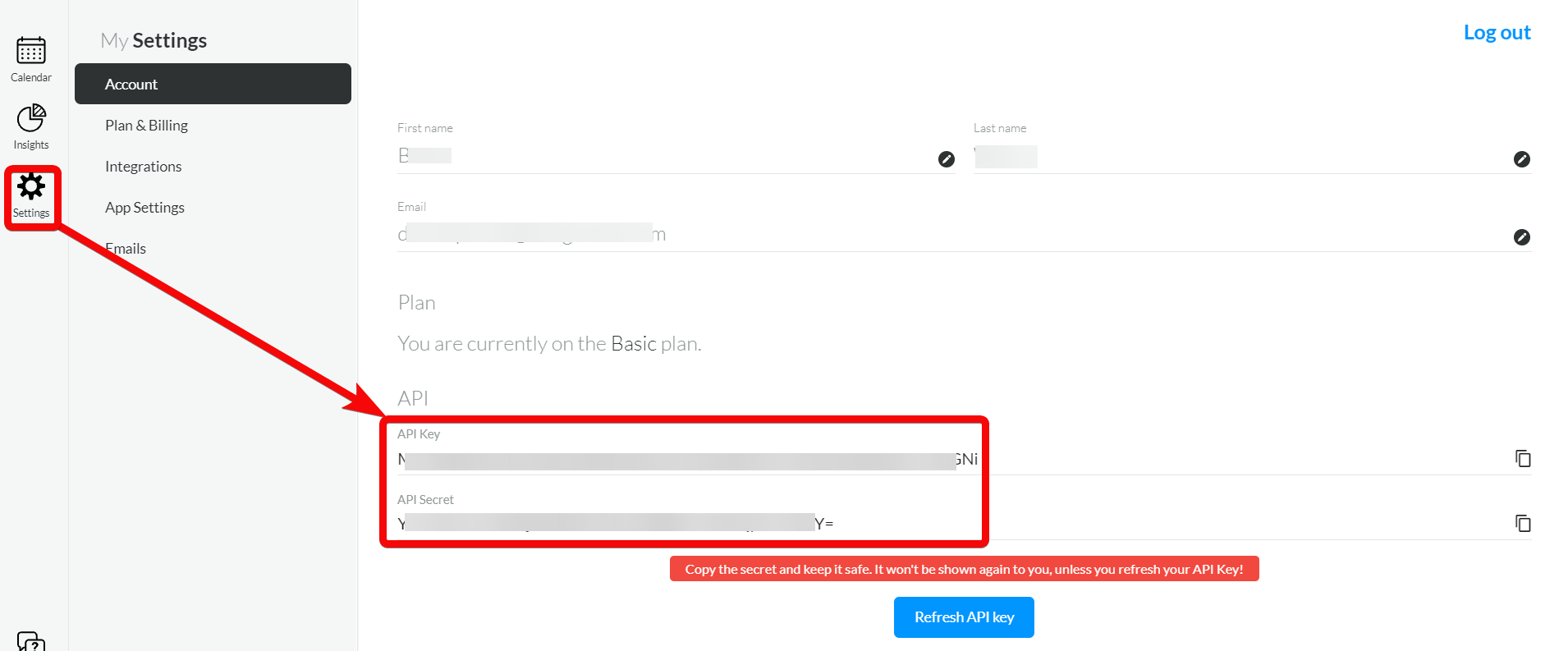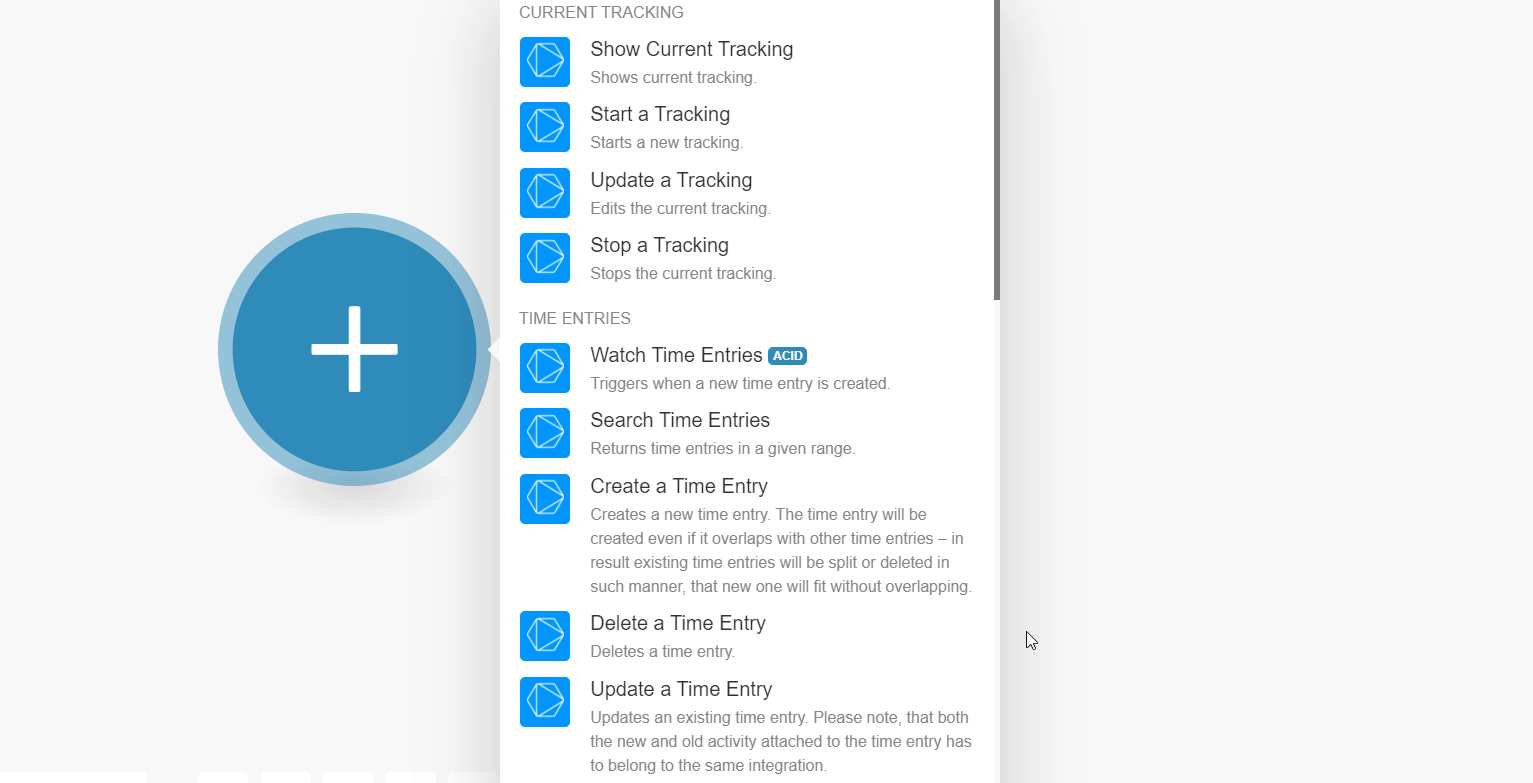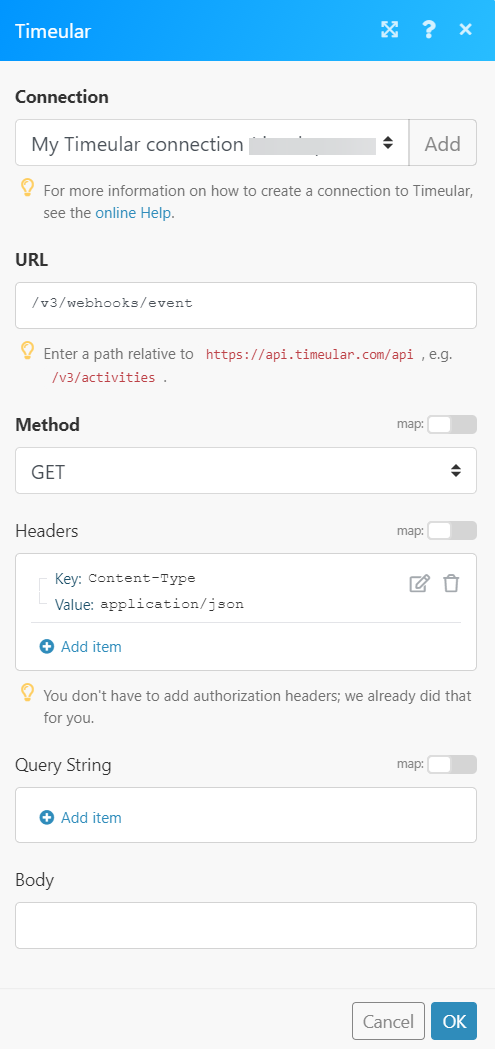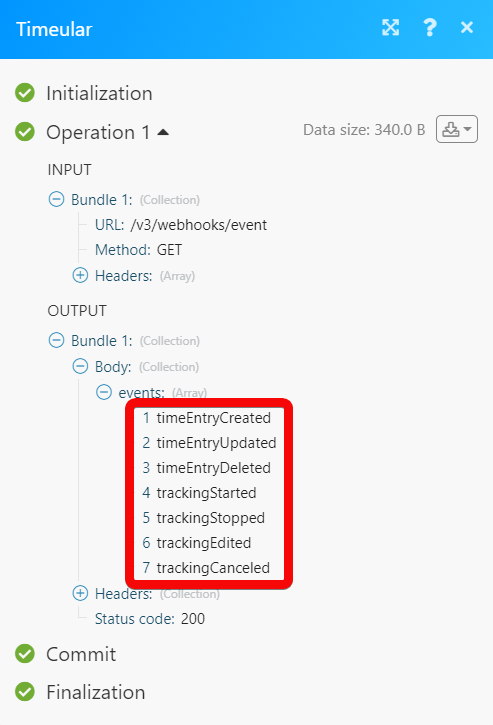Timeular
The Timeular modules allow you to monitor, create, update, show, start, stop, retrieve, list, and delete the current tracking, time entries, activities, tags, and mentions in your Timeular account.
Getting Started with Timeular
Prerequisites
A Timeular account - create an account at timeular.com/pricing/.
Connecting Timeular to Make
To connect your Timeular account to Make you need to obtain the API Key, and API Secret from your Timeular account and insert it in the Create a connection dialog in the Make module.
1. Log in to your Timeular account.
2. Click Settings and copy the API Key and API Secret values to a safe place.

3. Log in to your Make account, add a module from the Timeular app into an Make scenario.
4. Click Add next to the Connection field.

5. In the Connection name field, enter a name for the connection.
6. In the API Key and API Secret fields, enter the API key and secret values copied in step 3 respectively.
7. Click Continue.
The connection has been established.
Current Tracking
Show Current Tracking
Shows current tracking.
Start a Tracking
Start a Tracking.
Connection | |
Started At | Enter (map) the time at which you want to start the tracking. |
Note | Enter (map) the message text for tracking the time. You can tag or mention users at the end of the note text. |
Tags | Select or map the keywords or tags for tracking. |
Mentions | Select or map the users you want to notify or mention in the tracking. |
Update a Tracking
Edits the current tracking.
Connection | |
Activity ID | Select or map the Activity ID whose tracking you want to update. |
Started At | Enter (map) the time at which you want to start the tracking. |
Note | Enter (map) the message text for tracking the time. You can tag or mention users at the end of the note text. |
Tags | Select or map the keywords or tags for tracking. |
Mentions | Select or map the users you want to notify or mention in the tracking. |
Stop a Tracking
Stops the current tracking.
Connection | |
Stopped at | Enter (map) the time at which the tracking was stopped. |
Time Entries
Note
Make automatically creates a webhook in Timeular once you add an instant trigger to your scenario.
Watch Time Entries
Triggers when a new time entry is created.
Connection | |
Limit | Set the maximum number of time entries Make should return during one execution cycle. |
Search Time Entries
Returns time entries in a given range.
Connection | |
From Date | Enter (map) a date to search the time entries from the specified date. |
To Date | Enter (map) a date to search the time entries until the specified date. |
Limit | Set the maximum number of time entries Make should return during one execution cycle. |
Create a Time Entry
Creates a new time entry. The time entry will be created even if it overlaps with the other time entries - as a result existing time entries will be split or deleted in such a manner, that the new one will fit without overlapping.
Connection | |
Activity ID | Select or map the Activity ID for which you want to create a time entry. |
Started At | Enter (map) the start time of the time entry. |
Stopped At | Enter (map) the stop time of the time entry. |
Note | Enter (map) the note text for the time entry. You can tag or mention users at the end of the note text. |
Tags | Select or map the keywords or tags for time entry. |
Mentions | Select or map the users you want to notify or mention about the time entry. |
Delete a Time Entry
Delete a time entry.
Connection | |
Time Entry ID | Select or map the Time Entry ID you want to delete. |
Update a Time Entry
Updates an existing time entry.
Both the new and old activity attached to the time entry has to belong to the same integration.
Connection | |
Activity ID | Select or map the Activity ID for which you want to create a time entry. |
Started At | Enter (map) the start time of the time entry. |
Stopped At | Enter (map) the stop time of the time entry. |
Note | Enter (map) the note text for the time entry. You can tag or mention users at the end of the note text. |
Tags | Select or map the keywords or tags for time entry. |
Mentions | Select or map the users you want to notify or mention about the time entry. |
Get a Time Entry
Finds a time entry by its ID.
Connection | |
Time Entry ID | Select or map the Time Entry ID for whose details you want to retrieve. |
Activities
List Activities
Lists all activities.
Connection | |
Limit | Set the maximum number of activities Make should return during one execution cycle. |
Create an Activity
Creates a new activity. It should have a name, a space, and a color.
Connection | |
Space ID | Select or map the Space ID in which you want to create the activity. |
Name | Enter (map) the name of the activity. |
Color | Enter (map) the color you want to assign to the activity. For example, |
Integration | Enter (map) the integration you want to apply for the activity.Note: You must have a Pro plan to use third-party integrations, |
Update an Activity
Updates the name and color of the activity.
Connection | |
Activity ID | Select or map the Activity ID whose details you want to update. |
New Name | Enter (map) a new name of the activity. |
New Color | Enter (map) the color you want to assign to the activity. For example, |
Archive an Activity
Archives an activity. It does not affect existing time entries and this activity will still be available in analytics.
Connection | |
Activity ID | Select or map the Activity ID you want to archive. |
Tags & Mentions
Create a Tag
Creates a tag within the given space and scope (Timeular is the default).
Connection | |
Space ID | Select or map the Space ID in which you want to create the tag. |
Tag | Enter (map) the tag name you want to create. |
Scope | Enter (map) the scope details in which you want to create. |
Key | Enter (map) a key for the tag. For example, "tagtag". |
Delete a Tag
Deletes the given tag.
Connection | |
Tag ID | Select or map the Tag ID you want to delete. |
Update a Tag
Creates a new label for the tag.
Connection | |
Tag ID | Select or map the Tag ID whose details you want to update. |
New Label | Enter (map) a new tag name. The hashtag symbol |
Create a Mention
Creates a mention within the given space and scope (Timeular is the default).
Connection | |
Space ID | Select or map the Space ID in which you want to create the mention. |
Mention | Enter (map) the mention name. |
Scope | Enter (map) the scope details in which you want to create the mention. |
Key | Enter (map) a key for the mention. For example, |
Update a Mention
Creates a new mention label.
Connection | |
Mention ID | Select or map the Mention ID whose details you want to update. |
Label | Enter (map) a new mention name. The Hashtag symbol |
Delete a Mention
Deletes the given mention.
Connection | |
Mention ID | Select or map the Mention ID whose details you want to delete. |
List Tags
Lists all tags.
Connection | |
Limit | Set the maximum number of tags Make should return during one execution cycle. |
List Mention
Lists all mentions.
Connection | |
Limit | Set the maximum number of mentions Make should return during one execution cycle. |
Other
Note
Make automatically creates a webhook in Timeular once you add an instant trigger to your scenario.
Watch for Tracking Events
Triggers when an event given in its type parameter occurs.
Webhook Name | Enter (map) a webhook name. |
Connection | |
Event | Select or map the tracking events you want to watch. |
Watch for Time Entry Events
Triggers when an event given in its type parameter occurs.
Webhook Name | Enter (map) a webhook name. |
Connection | |
Event | Select or map the events whose time entry events you want to watch. |
Make an API Call
Performs an arbitrary authorized API call.
Connection | |
URL | Enter a path relative to For the list of available endpoints, refer to the Timeular API Documentation. |
Method | Select the HTTP method you want to use: GET to retrieve information for an entry. POST to create a new entry. PUT to update/replace an existing entry. PATCH to make a partial entry update. DELETE to delete an entry. |
Headers | Enter the desired request headers. You don't have to add authorization headers; we already did that for you. |
Query String | Enter the request query string. |
Body | Enter the body content for your API call. |
Example of Use - List Webhook Events
The following API call returns all the webhook events from your Timeular account:
URL:/v1/webhooks/event
Method:GET

Matches of the search can be found in the module's Output under Bundle > Body > events. In our example, 7 webhook events were returned:
